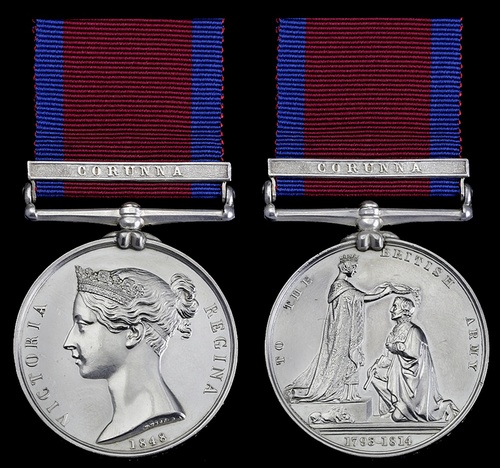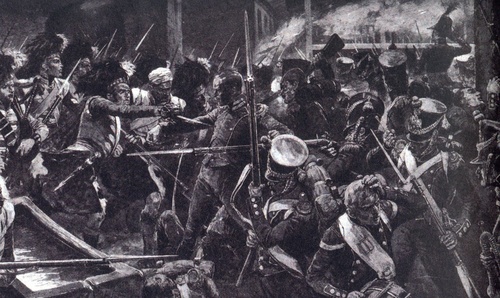Auction: 18003 - Orders, Decorations and Medals
Lot: 2
Military General Service 1793-1814, 1 clasp, Corunna (Dond. Skinner, 42nd Foot), extremely fine
Donald Skinner served at the Battle of Corunna on 16 January 1809 as a Private with the 1st Battalion, 42nd (Royal Highland) Regiment of Foot.
Part of Lieutenant-General Sir David Baird's 1st Division, the 'Black Watch' sailed from Gibraltar on 14 August 1808 and arrived in Lisbon two weeks later. Marching to Salamanca, they joined a British force of 23,500 infantry, 2,400 cavalry and 60 guns commanded by Sir John Moore. Moore's orders were to assist the Spanish rebellion against French occupation that had been triggered by the Dos de Mayo uprising in Madrid. The initial outlook was encouraging: a reformed Spanish army under General Castños defeated a French corps at Bailén on 16-19 July 1808, and by October only Navarre and Catalonia were in French hands.
Napoleon could not allow this 'Spanish ulcer' to fester. He was aided considerably by the disintegration of Spanish government following the monarchy's collapse, which caused power to devolve to local juntas. This meant that no co-ordinated Spanish attack came. In late October, Napoleon led a new Armée d'Espagne of 280,000 men across the Pyrenees, composed largely of the veterans of Austerlitz, Jena and Eylau. He staged a brilliant double envelopment of the Spanish armies, which Churchill later described as "an avalanche of fire and steel" (Churchill 1958, 257).
Outnumbered ten to one, Britain's only field army was being encircled. With 'the ogre of Europe' bearing down, Moore had no choice but to retreat to Corunna, more than 250 miles away. Lord Paget, his superb cavalry commander, screened the army's retreat at Sahagun and Benevente in late December. The light regiments - which Moore had trained personally at Shornecliffe - proved their worth by harassing the French advance guard. The retreat nevertheless sapped morale, with soldiers trudging knee-deep in snow through the Galician mountains. Discipline was largely maintained in the 42nd, although a number of drunk stragglers were left behind at Bembibre on 1 January 1809 and massacred by French dragoons. Ninety men of the regiment were marked 'missing' during the retreat.
Moore's army staggered into Corunna on the night of 11 January. The French were some distance behind, but British ships were nowhere to be seen. Transports only reached Corunna on 15 January, by which time Marshal Soult had appeared with 16,000 men. A desperate battle ensued at 2 p.m. the next day. The 42nd were in the thickest part of the fighting, which centred around the village of Elviña. When the French captured it, Moore led the 42nd forward to cries of "My Brave Highlanders - Remember Egypt!". He eagerly watched the 42nd's advance, even after receiving his mortal wound, a cannon-ball to the left breast. Elviña changed hands several times, the 42nd at one point charging a French column when all their ammunition had been expended. Soult withdrew that night; when dawn broke the 42nd sailed for Portsmouth, having lost nearly 400 killed and wounded.
Recommended reading:
Kieran, B. L., Corunna 1809: Sir John Moore's Battle to Victory and Successful Evacuation (London, 2011).
Subject to 20% VAT on Buyer’s Premium. For more information please view Terms and Conditions for Buyers.
Sold for
£800







